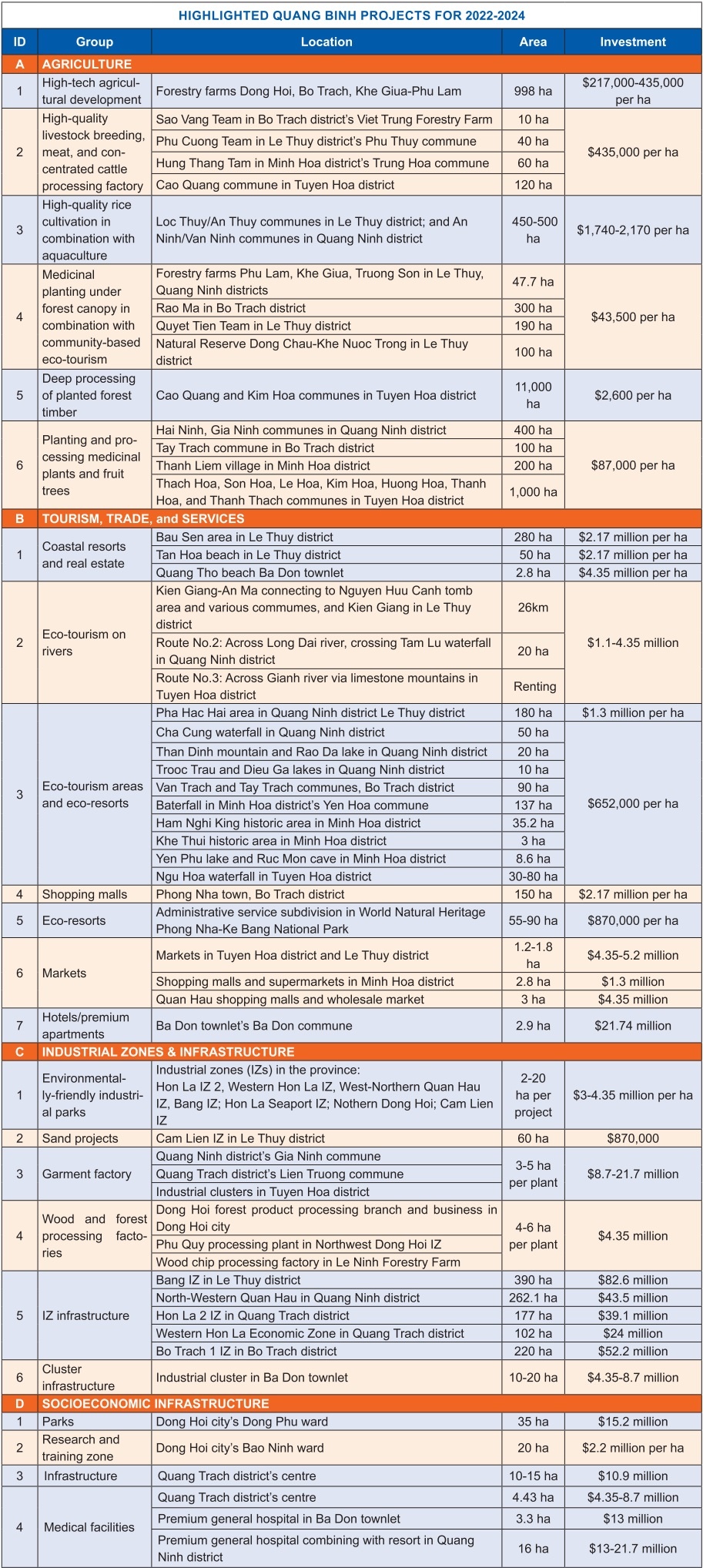New terminal top of Quang Binh agenda
 |
| New terminal top of Quang Binh agenda |
Last month, the prime minister asked provincial leaders and Airports Corporation of Vietnam (ACV) to prepare the groundwork so that the building of the terminal could begin as soon as possible.
In a December working session with Quang Binh People’s Committee, Minister of Transport Nguyen Van The noted that the existing medium-term plan for the new terminal, with a maximum capacity of 3-5 million passengers per year, may not be ambitious enough compared to the province’s attraction potential – suggesting that, in the long-term, a target of as much as 20-25 million passengers per year could be feasible.
“Quang Binh’s strength is tourism and Dong Hoi Airport is considered a major factor to exploit this advantage to the maximum. Once the airport is upgraded to meet international standards, it can extend international flight routes to South Korea, Japan, and a number of countries in Europe,” Minister The said.
The construction as it stands will be divided into numerous periods to ensure synchronisation of the transport infrastructure system.
Chairman of Quang Binh People’s Committee Tran Thang said the expansion of Dong Hoi Airport has been an expectation for numerous years as the existing facility is overloaded.
At the 17th congress for the 2020-2025 tenure of Quang Binh Party Committee, the province determined to focus on completing synchronised transport infrastructure, which is the navigator to promote the province’s socioeconomic growth and ensure security. As a result, the province took the two projects of the airport and the coastal road-Nhat Le 3 Bridge complex onto the list of those being prioritised for implementation.
“The province also expects to upgrade the existing one to an international airport, which is a key motivation to promote the province’s socioeconomic development. The proposal was added to the master planning on airports in the 2021-2030 period, with a vision towards 2050. However, to date, the preparation work for the airport’s upgrade is behind the approved process,” Thang said.
The airport first came into operation in 2008 with a designed annual capacity of 500,000 passengers. Five carriers are exploiting three domestic routes and one international one to Chiang Mai in Thailand. It catered to nearly 535,000 passengers in 2018 and almost 540,000 in 2019. The figure stood at around 487,750 passengers last year despite the country being unable to access cross-border travel.
In documents sent to relevant agencies, ACV’s proposal for the new terminal involved covering a total area of almost 21 hectares and being designed to cater to three million passengers each year. The venture will receive an investment of more than VND1.22 trillion ($48.7 million), funded by ACV.
Quang Binh is standing on the threshold of a new development period with the contribution of Dong Hoi Airport and other key projects such as Nhat Le 2 Bridge, the National Highway No.1, the Provincial Road No.565, another connecting Hon La Economic Zone (EZ), a concentrated cement industrial zone (IZ), and others. With public investment capital from the state budget currently limited, Quang Binh is making an effort to mobilise other capital sources such as official development assistance and public-private partnerships.
In order to modernise transport infrastructure, the provincial leadership is calling on investors to fund these urgent projects and other transport infrastructure activities involving inter-provincial and inter-district roads. In addition, the province will mobilise power sources to complete the technical infrastructure system at Cha Lo Bordergate Economic Zone and Hon La EZ. There are a number of other large-scale projects on the go in the province, including the 3,000MW liquefied natural gas-to-power project worth $4 billion, Hon La Non-Tariff Zone, the third phase of the $155 million Le Thuy 3 wind farm, an $86 million automobile assembly and production plant, and the $78 million Hon La IZ.
 |
What the stars mean:
★ Poor ★ ★ Promising ★★★ Good ★★★★ Very good ★★★★★ Exceptional
Related Contents
Latest News
More News
- SK Innovation-led consortium wins $2.3 billion LNG project in Nghe An (February 25, 2026 | 07:56)
- THACO opens $70 million manufacturing complex in Danang (February 25, 2026 | 07:54)
- Phu Quoc International Airport expansion approved to meet rising demand (February 24, 2026 | 10:00)
- Bac Giang International Logistics Centre faces land clearance barrier (February 24, 2026 | 08:00)
- Bright prospects abound in European investment (February 19, 2026 | 20:27)
- Internal strengths attest to commitment to progress (February 19, 2026 | 20:13)
- Vietnam, New Zealand seek level-up in ties (February 19, 2026 | 18:06)
- Untapped potential in relations with Indonesia (February 19, 2026 | 17:56)
- German strengths match Vietnamese aspirations (February 19, 2026 | 17:40)
- Kim Long Motor and AOJ Suzhou enter strategic partnership (February 16, 2026 | 13:27)

 Tag:
Tag:




















 Mobile Version
Mobile Version